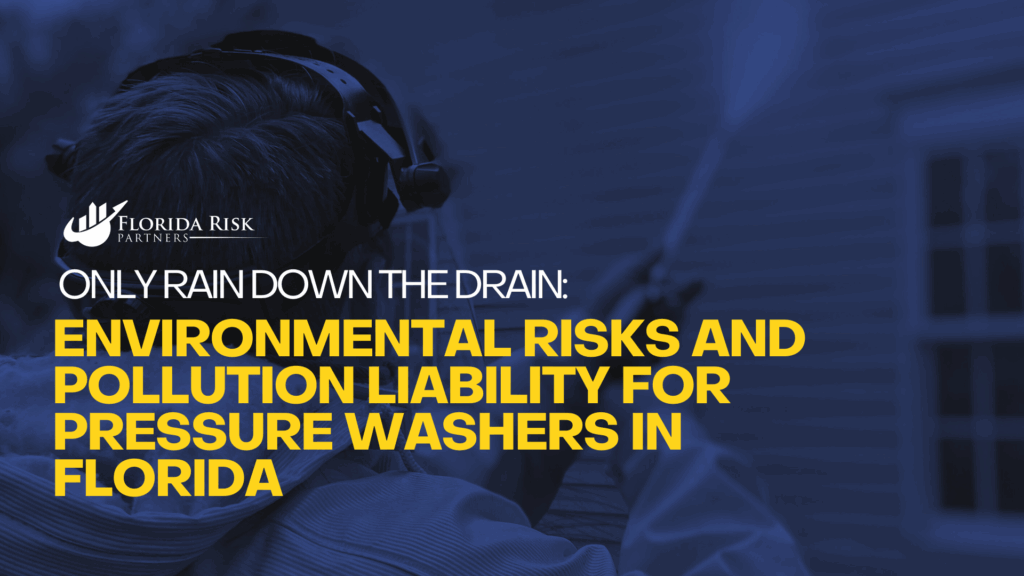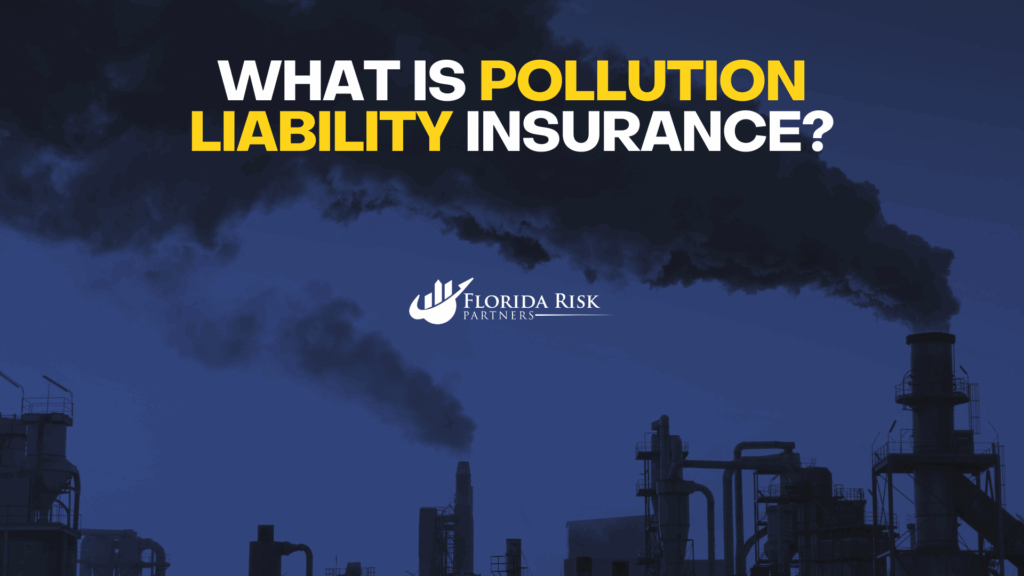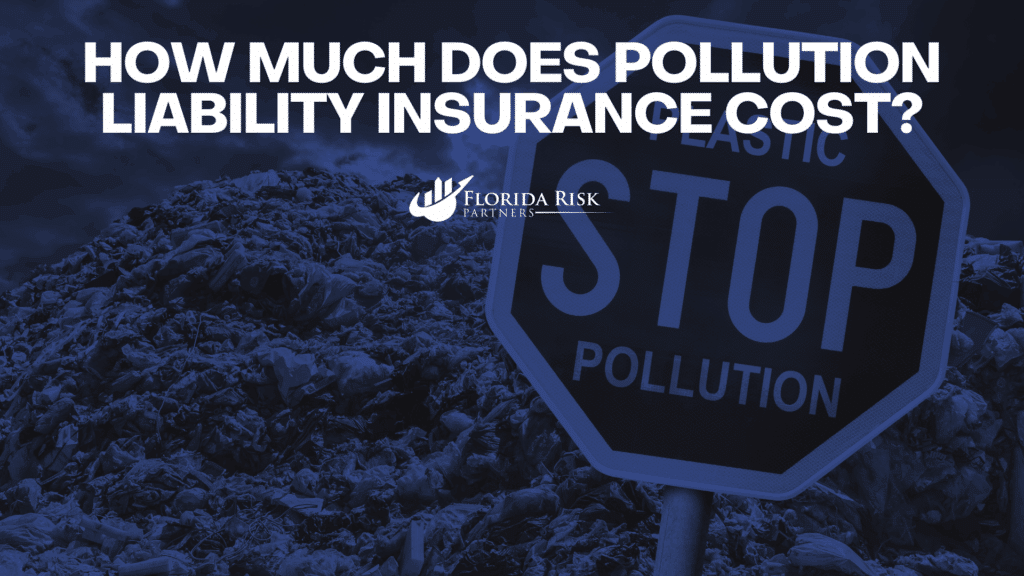-
Main Office: 1434 E. Bloomingdale Ave Valrico, FL 33596-6110
-
Phone: (888) 601-6660
-
Email: info@floridariskpartners.com

Pressure washing may seem like a clean business—after all, you’re in the business of removing dirt, mold, grease, and grime from homes, buildings, and sidewalks. But what happens to the dirty water and chemical residue after the cleaning is done? If that wastewater enters storm drains or local waterways, your pressure washing business could face serious environmental fines, reputational damage, and even lawsuits.
In Florida, where ecosystems are fragile and environmental enforcement is strict, understanding your pollution exposure—and having the right pollution liability insurance—is critical to protecting your business.
In this post, we’ll break down the environmental risks that pressure washing businesses face, explain relevant Florida laws, explore what pollution liability insurance covers, and offer practical steps to reduce runoff and liability.
Why Pressure Washing Poses Environmental Risks
Every time you pressure wash a surface, the runoff can carry:
- Dirt, oils, and grease
- Paint flakes, heavy metals, or asbestos particles (especially in older buildings)
- Detergents, bleach, or other cleaning chemicals
- Biological contaminants (like mold, mildew, and bacteria)
- Fuel residue from driveways or parking lots
If this contaminated water flows into a storm drain, lake, stream, or canal, your company could be violating the Clean Water Act, Florida’s NPDES (National Pollutant Discharge Elimination System) permit regulations, or local municipal codes.
The EPA and Florida DEP (Department of Environmental Protection) can fine businesses tens of thousands of dollars per day for illegal discharges—even if they’re accidental.
In fact, some Florida counties like Pinellas and Miami-Dade have local ordinances specifically regulating how pressure washing runoff must be managed, with penalties for noncompliance.
Common Pollution Scenarios for Pressure Washers in Florida
Here are a few real-world examples that could land your business in hot water:
Runoff from Roof Cleaning
You’re soft washing a residential roof in Clearwater using a sodium hypochlorite solution. The runoff flows down the driveway and into the storm drain, carrying chemical residue. A neighbor complains, and the HOA reports the incident. You’re fined for illegal discharge of pollutants.
Grease Cleanup at a Restaurant
While cleaning a commercial dumpster pad in Orlando, your crew accidentally washes grease and oil residue into the parking lot drain. The restaurant is part of a plaza with strict wastewater controls. The property manager holds you financially responsible for the cleanup and potential EPA reporting.
Paint Chips on a Historic Building
Your company is hired to wash the exterior of an older commercial property in St. Augustine. The paint contains lead, and flakes are washed into the street. Local authorities issue a stop-work order and an environmental review is launched.
These are not isolated cases—Florida pressure washers are facing increased scrutiny as municipalities crack down on runoff to protect drinking water, storm systems, and coastal habitats.
What Is Pollution Liability Insurance?

Pollution liability insurance is a specialized commercial policy designed to cover claims arising from environmental damage caused by your business operations. It provides protection for:
- Cleanup costs
- Governmental fines or penalties
- Legal defense
- Third-party bodily injury or property damage from contamination
- Site remediation
It’s especially relevant for businesses that work with chemicals, generate runoff, or clean surfaces that may contain hazardous materials—like pressure washing contractors.
What Does Pollution Liability Insurance Cover?
Here’s how a pollution liability policy could help your pressure washing company in Florida:
Accidental Chemical Discharge
If a cleaning agent leaks from your rig and contaminates landscaping, soil, or a nearby waterway, your policy can cover cleanup, restoration, and legal fees.
Runoff into Storm Drains
If regulators determine that your wastewater entered a storm system and caused pollution, your policy can help pay fines and required mitigation costs.
Damage to Wildlife or Sensitive Ecosystems
Florida is home to protected waterways, wetlands, and endangered species. If your operations harm these areas, a pollution policy helps manage the fallout.
Lawsuit Defense
If a third party sues your company—whether it’s a municipality, homeowner, or environmental group—your policy covers defense costs and any court-awarded damages (up to the policy limit).
Pollution liability is not typically included in a general liability policy. In fact, most GL policies have a pollution exclusion—leaving you fully exposed unless you carry this specific coverage.
Do Florida Pressure Washers Need Pollution Liability Coverage?
In short: yes—especially if you:
- Perform soft washing or roof cleaning (using chemicals)
- Work near waterways or drainage systems
- Wash large areas like parking garages, gas stations, or commercial buildings
- Handle commercial or industrial clients with strict environmental requirements
- Operate in areas with enhanced local stormwater rules (such as Pinellas, Sarasota, Miami-Dade)
In many Florida cities, you may even be required to show proof of pollution coverage to obtain a business license or vendor contract.
How Much Pollution Liability Coverage Do You Need?
Coverage amounts vary based on your operations, but many pressure washing businesses carry:
- $1 million per occurrence
- $2 million aggregate
Higher limits may be required for municipal or industrial contracts, or if you’re doing high-risk work like graffiti removal, chemical stripping, or restoration of hazardous sites.
How Much Does Pollution Liability Insurance Cost?

Premiums depend on:
- The scope of your services
- Use of chemicals or solvents
- Location and environmental exposure
- Prior claims history
- Annual revenue
Most Florida pressure washing businesses pay $750 to $2,500 per year for a standalone pollution policy. This cost is negligible compared to the potential out-of-pocket exposure from a single runoff violation or cleanup order.
Tips to Reduce Your Environmental Risk
Prevention is the best protection. Here’s how to lower your pollution risk and possibly even reduce your premium:
Use Eco-Friendly Products
Choose biodegradable, non-toxic detergents approved for outdoor use. Many Florida cities now require contractors to use low-impact or green-certified cleaners.
Block Storm Drains
Before washing near pavement, cover or block nearby storm drains. Use berms or vacuum systems to control where runoff goes.
Reclaim Wash Water
Invest in a recovery system that collects and filters wastewater on-site. Not only does this reduce pollution, but it positions your business as eco-responsible—a growing selling point for Florida clients.
Follow Local Ordinances
Research local environmental rules for each city or county you work in. For example:
- Miami-Dade requires all pressure washing wastewater to be collected and disposed of at approved locations.
- Pinellas County enforces the “Only Rain Down the Drain” campaign and fines for any non-stormwater discharges.
Train Your Crew
Your employees are your frontline defense. Make sure they’re trained on:
- Proper chemical dilution
- Wastewater containment
- Emergency spill response
Real-World Example: The Cost of Not Being Covered
A Florida pressure washing contractor was hired to clean a luxury condo building near the Intracoastal Waterway. During the job, wastewater containing chlorine-based cleaner entered a nearby drain that fed directly into a manatee habitat.
A local resident filed a complaint, and the Florida DEP issued a violation. The contractor was fined $20,000, and cleanup costs exceeded another $12,000.
They didn’t carry pollution liability insurance—and had to pay everything out of pocket.
Final Thoughts: Don’t Let Dirty Water Sink Your Business
The public and regulatory spotlight on environmental issues is only getting brighter—and in Florida, pressure washing runoff is a key concern.
Having the right pollution liability insurance isn’t just smart protection—it’s a sign that your business is serious, responsible, and ready to serve commercial and municipal clients with confidence.
Combined with best practices and proper employee training, this coverage keeps your pressure washing company legally compliant, financially protected, and reputation-strong—no matter where the runoff flows.
Ready to Protect Your Business from Environmental Risks?
We specialize in helping Florida pressure washing businesses get affordable, compliant pollution liability coverage. Whether you need a standalone policy or a complete package, we’ll help you stay clean in every sense of the word.
Call Us Or
Schedule an Appointment
Select an agent below to view our online calendars and select a day and time that works best for you or call us directly at 888-601-6660. When you use our online calendars, you will receive an email with more information.



